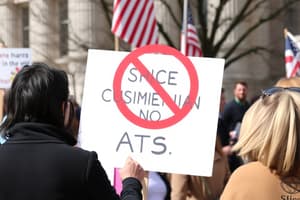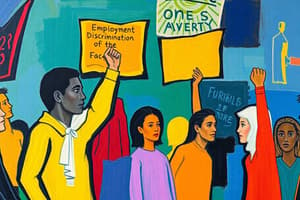Podcast
Questions and Answers
What was struck down by the Supreme Court in 2013 related to the Voting Rights Act of 1965?
What was struck down by the Supreme Court in 2013 related to the Voting Rights Act of 1965?
- Voter ID laws
- Gerrymandering restrictions
- The preclearance requirement (correct)
- Felon voting rights
Which of the following best describes de facto segregation?
Which of the following best describes de facto segregation?
- Legally enforced segregation
- Segregation that occurs without legal enforcement (correct)
- Forced integration in schools
- Segregation by community standard
Which level of scrutiny is applied when considering laws that affect race or national origin?
Which level of scrutiny is applied when considering laws that affect race or national origin?
- Rational basis test
- Economic interest test
- Strict scrutiny test (correct)
- Intermediate scrutiny test
What is the primary purpose of the strict scrutiny test?
What is the primary purpose of the strict scrutiny test?
What practice does gerrymandering primarily affect?
What practice does gerrymandering primarily affect?
Which type of segregation was enforced by law in the United States before the 1960s?
Which type of segregation was enforced by law in the United States before the 1960s?
What is a key characteristic of the intermediate scrutiny test?
What is a key characteristic of the intermediate scrutiny test?
What does the rational basis test require for a challenged law?
What does the rational basis test require for a challenged law?
What was upheld in the Supreme Court case Maryland v. King?
What was upheld in the Supreme Court case Maryland v. King?
Which Supreme Court case upheld the rights of children from Jehovah’s Witness families regarding the Pledge of Allegiance?
Which Supreme Court case upheld the rights of children from Jehovah’s Witness families regarding the Pledge of Allegiance?
What rule did the Supreme Court case Brandenburg v. Ohio (1969) establish?
What rule did the Supreme Court case Brandenburg v. Ohio (1969) establish?
What was decided in the Supreme Court case Citizens United v. Federal Election Commission?
What was decided in the Supreme Court case Citizens United v. Federal Election Commission?
What does the case McDonald v. Chicago (2010) signify regarding the 2nd Amendment?
What does the case McDonald v. Chicago (2010) signify regarding the 2nd Amendment?
For a public official’s story to be libelous, what standard must be met according to New York Times Co. v. Sullivan?
For a public official’s story to be libelous, what standard must be met according to New York Times Co. v. Sullivan?
Which Supreme Court case concluded that the government must have a compelling interest to restrict religious practices?
Which Supreme Court case concluded that the government must have a compelling interest to restrict religious practices?
In Schenck v. United States (1919), what concept was identified related to free speech?
In Schenck v. United States (1919), what concept was identified related to free speech?
What is the main purpose of the exclusionary rule?
What is the main purpose of the exclusionary rule?
Which of the following statements best describes the 'clear and present danger' test?
Which of the following statements best describes the 'clear and present danger' test?
Which of the following amendments does NOT specifically address due process of law?
Which of the following amendments does NOT specifically address due process of law?
How do 'fighting words' differ from other forms of speech in terms of constitutional protection?
How do 'fighting words' differ from other forms of speech in terms of constitutional protection?
What are the three requirements of the Lemon Test used in Supreme Court cases?
What are the three requirements of the Lemon Test used in Supreme Court cases?
What is the primary distinction between de jure segregation and de facto segregation?
What is the primary distinction between de jure segregation and de facto segregation?
In the context of civil liberties, what does due process of law primarily ensure?
In the context of civil liberties, what does due process of law primarily ensure?
The 'imminent lawless action' test primarily determines the legality of which type of speech?
The 'imminent lawless action' test primarily determines the legality of which type of speech?
Flashcards are hidden until you start studying
Study Notes
Civil Rights
- Civil rights guarantee equal citizenship and protection from discrimination
- De jure segregation: legally enforced practices, like school segregation in the South before the 1960s
- De facto segregation: practices that occur without legal enforcement, like school segregation in many parts of the US today
- Strict Scrutiny Test: places the burden of proof on the government to demonstrate a law related to racial discrimination is constitutional.
- Gerrymandering: apportionment of voters in districts to give unfair advantage to a specific racial/ethnic group or political party.
- Rational Basis Test: the lowest level of scrutiny, used to assess laws related to due process or equal protection questions
- Intermediate Scrutiny Test: the second level of scrutiny, used to assess laws that are based on sex, illegitimacy, or sexual orientation
- Strict Scrutiny Test: the highest level of scrutiny, used to assess laws that apply to race or national origin
Voting Rights Act
- The Supreme Court struck down the preclearance provision of the 1965 Voting Rights Act in 2013
- Gerrymandering can dilute the power of minority voting groups, particularly Latinos
Separate but Equal
- The "separate but equal" doctrine allowed for segregation of social facilities
Civil Liberties
- Civil liberties: protections from government power, distinct from civil rights.
- Habeas corpus: the right of an individual in custody to be brought before a judge for a fair trial
- Selective incorporation: incorporating the Bill of Rights as limits on states through the 14th Amendment
- Establishment Clause: Freedom from the government imposing a specific religion
- Free Exercise Clause: Freedom to practice one's religion of choice without government interference, including the right to be a non-believer
- Clear and Present Danger Test: determined whether speech was protected or unprotected based on its potential to harm society
- Imminent Lawless Action Test: speech is protected unless it actively incites a specific illegal action
- Libel: false and damaging information published in writing
- Slander: false and damaging information spoken
- Due process of law: the right of citizens to be free from arbitrary actions by the national or state governments
- Exclusionary Rule: the Court can exclude evidence obtained illegally
- Double jeopardy: a person cannot be tried twice for the same crime
Tech Companies and Liberty vs Security
- The disagreement between tech companies and the government regarding accessing private citizen data reflects a long-standing tension between liberty and security
Exclusionary Rule
- The exclusionary rule is the most significant restraint on police behavior, preventing the use of illegal evidence that could lead to a conviction
Speech Plus
- Public events with speakers, protests, and leaflets are examples of "speech plus" free speech
1st Amendment and Education
- The First Amendment, specifically free speech, is likely to have a daily impact on education experiences
Due Process
- The 4th, 5th, 6th, and 8th Amendments define due process of law.
Fighting Words:
- "Fighting words" are outside constitutional protection because they directly incite violence.
The Lemon Test
- To be considered constitutional, government action toward religion must be secular in purpose, not promote or inhibit religious practice, and avoid excessive entanglement with religion.
DNA Testing
- In Maryland v. King (2013), the Supreme Court upheld the police's ability to conduct DNA testing on arrestees without individualized suspicion
Flag Saluting
- West Virginia State Board of Education v. Barnette (1943) upheld the rights of children of Jehovah’s Witness families to refuse to salute and pledge allegiance to the flag due to their religious beliefs
Contraceptive Coverage
- Burwell v. Hobby Lobby Stores (2014) ruled that owners did not have to provide female contraceptive coverage based on religious beliefs.
Prisoner Beards
- Holt v. Hobbs (2015) ruled that a prison policy prohibiting beards violated prisoners' religious freedom
Clear and Present Danger
- Schenck v. United States (1919) established the "clear and present danger" test.
Imminent Lawless Action
- Brandenburg v. Ohio (1969) replaced the "clear and present danger" test with the "imminent lawless action" test.
Campaign Spending
- Buckley v. Valeo (1976) declared that restrictions on campaign spending by or on behalf of candidates were unconstitutional.
Issue Ads
- Federal Election Commission v. Wisconsin Right to Life (2003) ruled that issue ads by political advocacy groups were protected speech as long as they focus on issues and not calls to vote for or against a candidate.
Corporate Funding of Elections
- Citizens United v. Federal Election Commission (2010) ruled that a law banning corporate funding of independent electioneering broadcasts was unconstitutional.
Defamation
- New York Times Co. v. Sullivan (1964) established that for a story about a public official to be libelous, it must be untrue and result from “actual malice” or “reckless disregard” for the truth.
Gun Ownership
- McDonald v. Chicago (2010) applied the 2nd Amendment to states and localities, meaning these entities cannot ban the ownership of firearms kept in a person's home.
- District of Columbia v. Heller (2008) focused on whether the 2nd Amendment protected the right to keep and bear arms for self-defense or only for state militias.
Studying That Suits You
Use AI to generate personalized quizzes and flashcards to suit your learning preferences.




